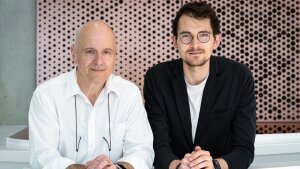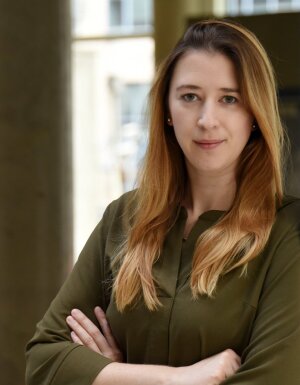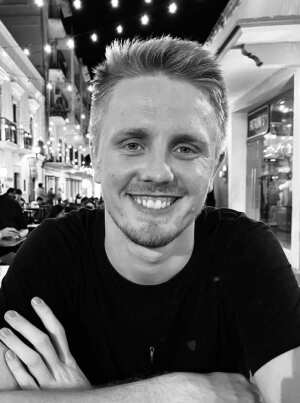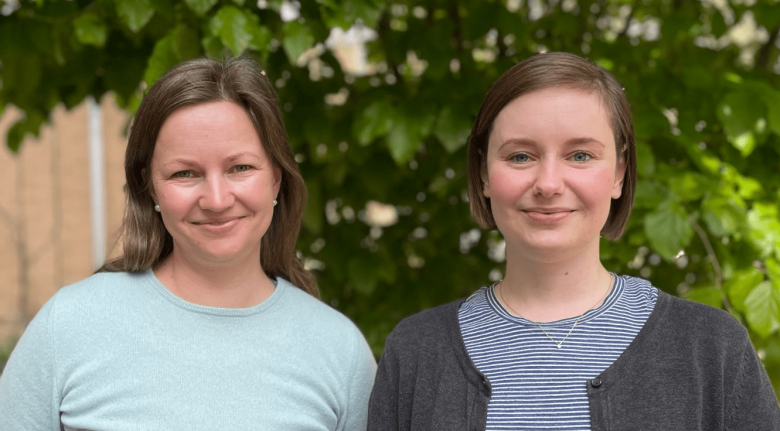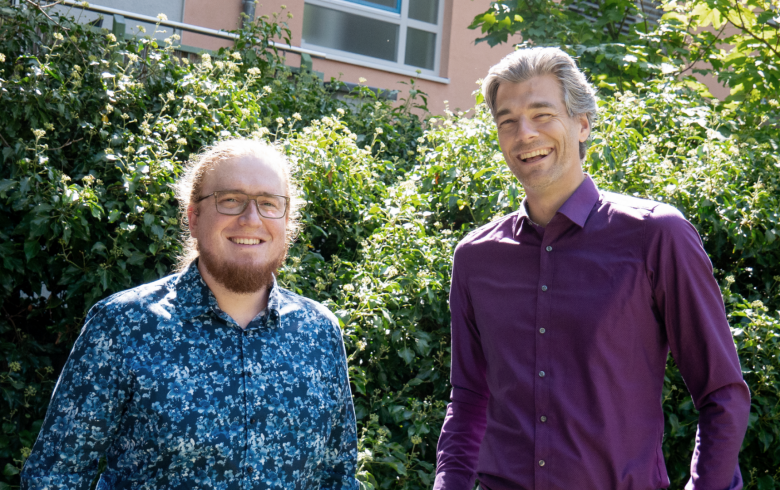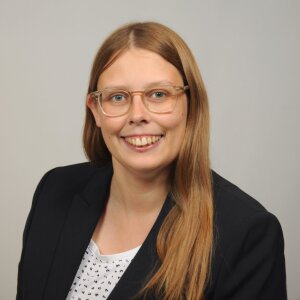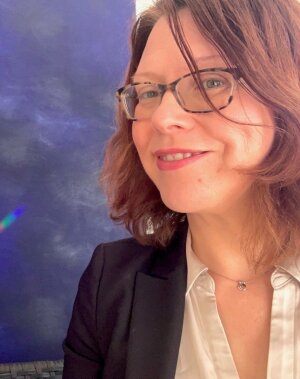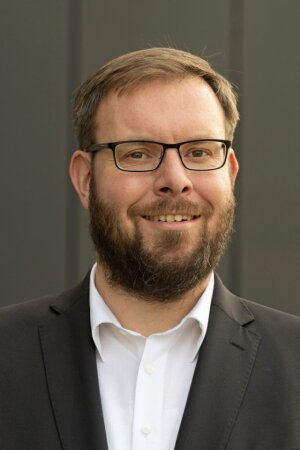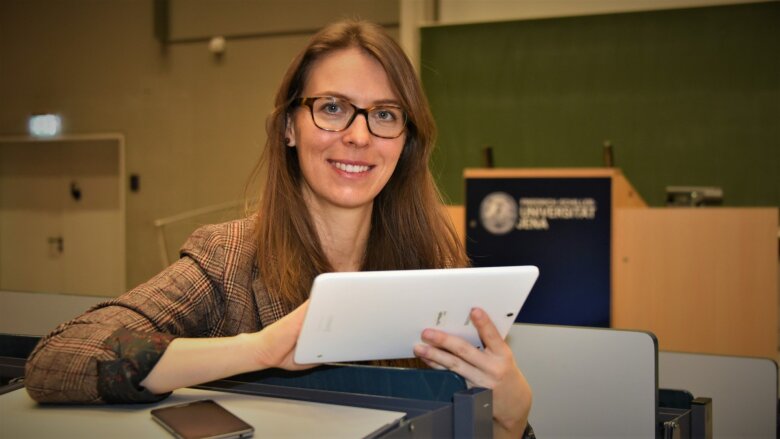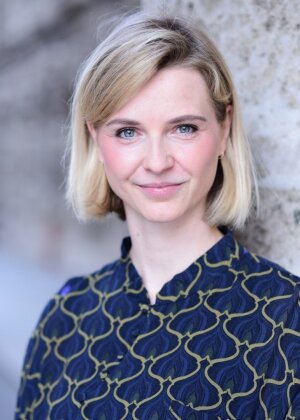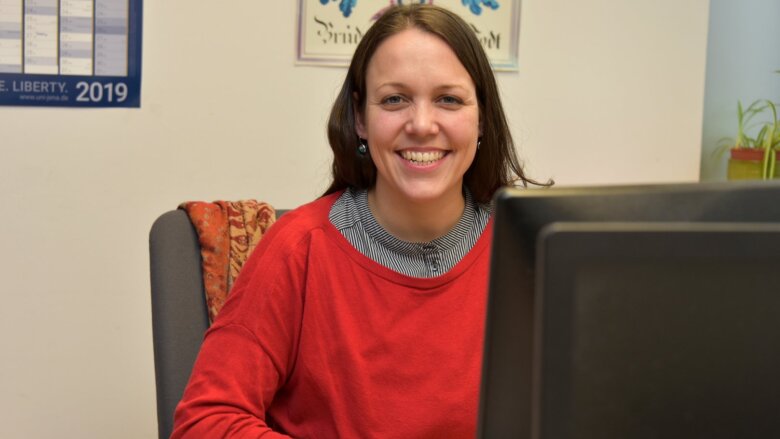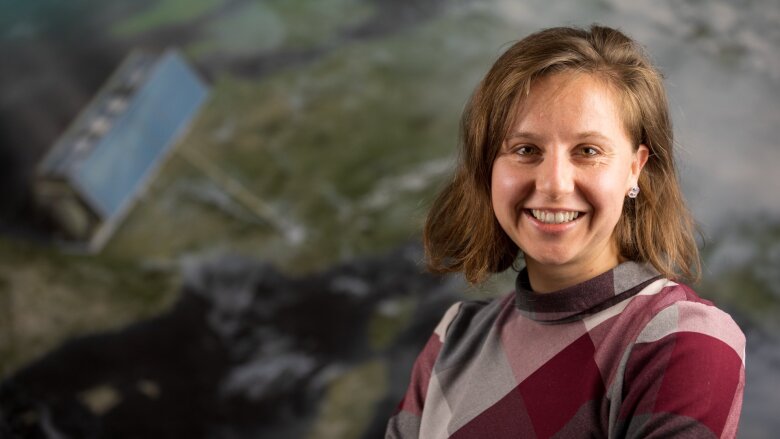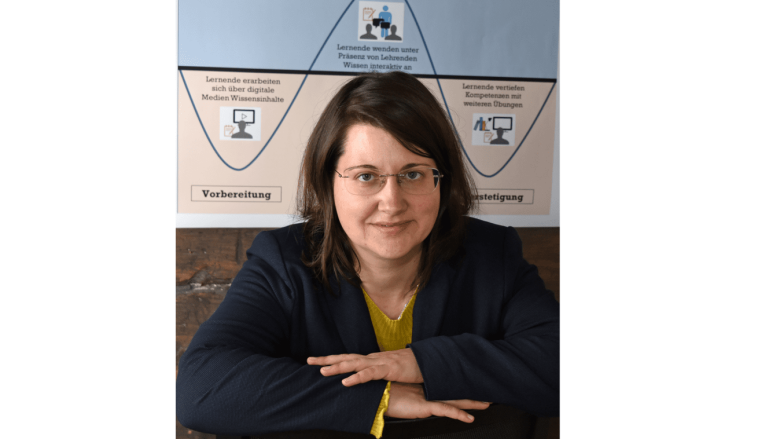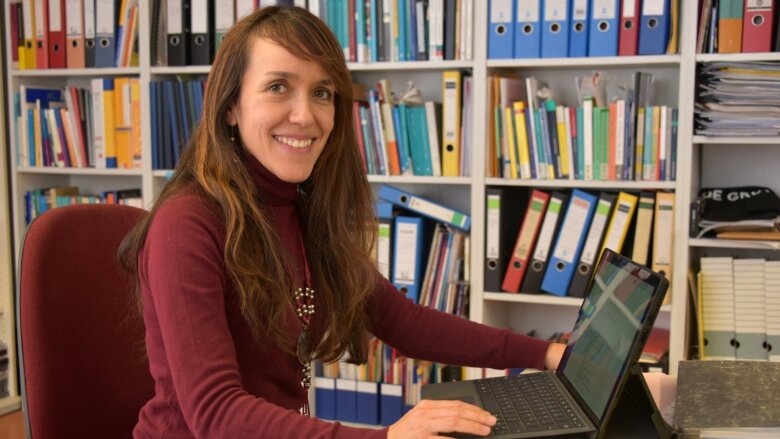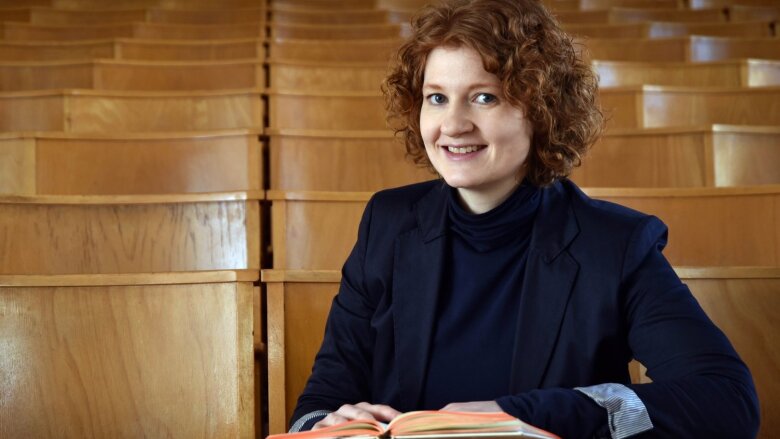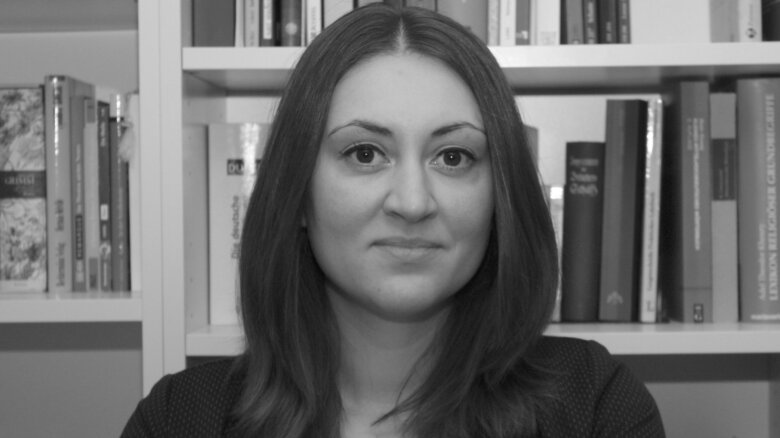
As part of the Thuringian Strategy for Digitisation in Higher Education, the Thuringian Ministry of Education, Science and Culture, in cooperation with the Stifterverband, has awarded several fellowships worth up to 50,000 euros for innovations in digital university teaching in recent years. Below you can find information about the fellowships that have been awarded to lecturers at Friedrich Schiller University Jena.
-
Prof. Dr. Christoph Steinbeck and Dr. Kevin Jablonka (2026): AI-supported learning environments for science lab practicals: Integration of simulations, virtual labs, and machine learning
Christoph Steinbeck and Kevin Jablonka
Image: Christoph SteinbeckChristoph Steinbeck and Kevin Jablonka want to develop AI-supported learning environments for science lab practicals in this project, integrating simulations, virtual labs, and machine learning.
The project aims to modernize basic chemistry courses by incorporating electronic lab books with FAIR data management into the curriculum. Browser-based virtual laboratories combine experiments with simulations and enable safe, repeatable exploration. AI-supported tools analyze data collected by students and promote a critical understanding of the possibilities and limitations of AI. This fosters systemic thinking across theory, practice, and data analysis. Sustainability and broad transfer are achieved through links to NFDI4Chem and FAIRmat, as well as a strategy of Open Educational Resources (OER) – freely accessible, openly licensed teaching and learning materials with a GitHub repository, OER repositories, and a project website. Cooperative workflows facilitate the sharing, reuse, and publication of student results as OER in a sustainable manner. -
Prof. Dr. Anika Klafki (2026): KlausI - The digital exam trainer
Prof. Dr. Anika Klafki
Image: Anne Günther (University of Jena)The “KlausI” project is developing an innovative AI that offers law students personalized, interactive exam training. The AI is operated on a server at Friedrich Schiller University Jena and opens up a free, data-saving learning environment. The innovation complements the courses on offer and helps students to improve their case-solving skills independently. They receive individually tailored case studies (including on Thuringian state law) and detailed evaluations of their solutions in terms of content, structure, style and level of argumentation. “KlausI” increases learning efficiency, promotes educational equity and increases the attractiveness of Jena as a place to study. By using an open basic model with a separate knowledge database, the AI is future-proof and expandable. The open source project offers great transfer potential for other law faculties and departments with similar exam requirements.
-
Felix Fahnroth (2025): ChatEX - Differentiation in teacher training through a reflected use of AI chatbots
project leader Felix Fahnroth
Image: Felix FahnrothThe ‘ChatEX’ project aims to further differentiate and improve teacher training at the Institute of Romance Studies through the use of an AI chatbot. Students attending introductory seminars on the didactics of Romance languages should be able to use the chatbot to ask individual and anonymous comprehension questions and have concepts and models based on the lecture content explained to them in more detail. ChatEX also enables students to test their own specialist knowledge by simulating a module exam using open questions.
The project builds on the previous work of the Chair of Didactics of Romance Languages in Schools and integrates findings from research into computer-assisted language learning. It is expected that the chatbot will create a flexible, personalised and error-friendly learning environment, provide students with better access to learning content and at the same time strengthen their media skills. A reflective approach to AI language models that sensitises students to both the strengths and weaknesses of these systems is a central aspect of the project.
-
Dr Susann Schäfer (2025): Podcasts as a digital examination format - implementation, accompanying research and transfer
project leader Dr. Susann Schäfer and Anika Zorn
Image: Jana WolterstorfWith the use of ChatGPT (and comparable chatbots) as an ‘aid’ in the preparation of seminar papers and theses, the fundamental question arises in university teaching as to what extent written forms of examination, such as term papers, represent an appropriate examination format. The project ‘Podcasts as a digital examination format’ is concerned with developing a taxonomy of podcasts as an examination format in the sense of constructive alignment from the research literature to date and proposing assessment standards according to the different learning objectives. This will be verified with experts. The results will be used to apply podcasts in university teaching in an even more targeted manner.
-
Max Grund and Clemens Beck (2025): DigiHistDB - Development of a self-learning module for database modelling and analysis in the historical sciences
project leader MAx Grund and Clemens Beck
Image: Lars HeinrichThe accelerating pace of digitalisation also presents the humanities disciplines with the challenge of having to adapt their teaching concepts. The planned teaching innovation ‘DigiHistDB’ is therefore intended to develop a self-study module to build up data (banking) skills for the study of history. Two courses will serve to lay the necessary foundations and evaluate the concepts required for the successful creation and implementation of a self-learning module for dealing with historical issues using 21st century tools. To this end, skills in data modelling and collection, database creation and visualisation, as well as the interpretation of results and critical reflection on work with digital humanities methods will be taught. The self-study module will be designed in such a way that it can also be used as part of other history degree programmes and adapted for other humanities subjects.
-
Dr Christin David (2024): Illustrative numerical experiments for MINT first-year students
Dr. Christin David
Image: Anne Günther (University of Jena)In the project Illustrative numerical experiments for MINT first-year students, numerical experiments are developed in comprehensive lessons for self-study as well as in smaller work blocks for synchronous use in lectures and practice seminars, which visualise mathematical basics and scientific concepts and explain their context. This is to be done in a web-based environment, the free Jupyter Notebooks, and will increasingly require and promote programming skills. Special attention is to be paid to heterogeneous student groups, for example due to the choice of subjects for teacher candidates or different previous knowledge in the area of programming.
The developed notebooks are made available in a digital course room such as Moodle. Classical exercise notes are supplemented by numerical tasks in the exercise seminar, and the simultaneous work on a problem from the STEM area, as well as the visualisation of its mathematical representation, is intended to strengthen the understanding of these relationships.
-
Prof. Dr. Stefan Flörchinger (2023): Establishment of an Academic Studio
project leader Dr. Stefan Flörchinger
Image: Dr. Stefan FlörchingerWith the Academic Studio, a workshop is to be established for the creation of digital teaching and learning content. It's mainly by and for students of physics and other STEM subjects, , from which, however, other students and teachers at schools can also benefit. The digital content is to be made available in addition to the university's normal offerings, for example in the form of supplementary courses for research-related special topics, but also specially prepared didactic material, for example for student teachers. At the same time, the Academic Studio serves as a technological playground and development platform. This allows students and lecturers to try out the latest technologies, learn how to use them and develop them further.
The active role that students are expected is an important aspect to play in the Academic Studio. They should help to digitally process the teaching and learning materials, make suggestions for improvements or work in the development team - in this way they gain valuable experience for their future tasks, for example in science, business or in the teaching profession.
-
Dr Denise Schaller (2023): Involving teaching hospitals in course planning and training of medical students using medical didactic training in a blended learning format
project leader Dr. Denise Schaller
Image: Event Foto JenaThe increased representation of primary care hospitals in medical studies is the aim of the award-winning project in order to counter the current reluctance of medical students to work as doctors in rural areas. This is to become possible through the more intensive integration of the academic teaching hospitals of the Jena University Hospital in the practical training of medical students in the subject of neurology. A blended learning concept is being developed for a six-hour learning module together with lecturers from primary and regular care hospitals throughout Thuringia. The students prepare intensively with the created online materials for different aspects of learning on the patient in the context of teaching rounds, internships in functional diagnostics and examination courses, in order to then be able to apply them decentrally on site in the teaching hospitals.
-
Dr Marcel A. Kamp and Dr Matthias A. Mäurer (2022): Digital student tumour conference in inverted classroom format
Project leaders: Dr Marcel A. Kamp (r.) and Dr Matthias A. Mäurer
Image: Michael Szábo/UKJModern treatments for cancer patients are only possible in interdisciplinary teams. In so-called tumour boards, examination findings from different disciplines are compiled and therapy recommendations are discussed together. Participation in such tumour conferences is not yet part of the curriculum in human medicine. Therefore, the physicians Dr Marcel A. Kamp and Dr Matthias A. Mäurer have developed the now funded project "Digitale studentische Tumorkonferenz im inverted classroom-Format". In addition to specialist knowledge, the participating students are to learn how a neuro-oncological tumour board works, effective communication, the creation of personalised therapy plans as well as the discussion and consideration of ethical aspects of medical action. The courses are designed in such a way that the students prepare themselves with online material and use the event for in-depth and interactive discussion of what they have learned.
-
Prof. Dr Miriam Rose (2022): Writing to learn. Digital writing-based teaching in systematic theology
Project leader: Prof. Dr Miriam Rose
Image: Andreas KuhnWriting is itself a means of learning, not just a way to produce texts. In this project, writing exercises will be used to encourage students to engage with theories independently, to develop their own position on them and to experience themselves as self-effective in their learning process.
In the background is the concept from American university didactics "writing to learn". Examples of such writing exercises are: 3 minute exercise "What interests you most about this text?", "Which topics from the lecture would you like to deal with further?" or "What was particularly important for you in today's seminar session?". With the help of digital tools, including Padlet, students can also collaborate anonymously, i.e. comment on a text together, write down examples or note references to other texts/theories. Many combinations of present and digital teaching, of asynchronous and synchronous teaching elements can be flexibly designed.
It has been experimentally proven that writing things down oneself makes learning more sustainable and that handwritten writing in particular reinforces independent acquisition.
The project is being developed for introductory courses in the field of systematic theology, but many transfer possibilities to the cultural and social sciences and beyond are envisaged.
-
Dr Thomas Kaiser (2022): Understanding with a second glance: The Digital Repository for Mathematical Methods
Project leader: Dr Thomas Kaiser
Image: Jens Meyer (University of Jena)"Verständnis mit dem zweiten Blick: Das digitale Repositorium für Mathematische Methoden" is the name of the funded project by physicist Dr Thomas Kaiser. He wants to develop a teaching-learning format to improve the introductory phase of studies in the STEM subjects. To this end, the start of studies is to be equalised in terms of time, attendance phases are to be used more optimally and students are to be networked more early on. And in order to consolidate early subject knowledge, the contents are to be taken up again and deepened in later semesters. Dr Kaiser wants to achieve these goals by using open-source digital methods to analyse learning.
-
Theres Werner (2021): Learning digital teaching in German as a foreign and second language
Project leader: Theres Werner
Image: Anne Günther (University of Jena)The project Digitales Lehren lernen in Deutsch als Fremd- und Zweitsprache (Learning digital teaching in German as a foreign and second language, DiLele DaF/DaZ) by Theres Werner was awarded a Fellowship für Innovationen in der Digitalen Hochschullehre Thüringen announced by Stifterverband and funded by the Thuringian Ministry of Economics, Science and Digital Society. The DiLele DaF/DaZ project addresses the current situation of distance learning with the aim of integrating this form of teaching/learning into teacher training curricula and systematically developing it further. The situation since March 2020 has made it increasingly clear that ‘digital competence [...] is a key competence of the 21st century’ (DigCompEdu 2017: 1). Academic teaching had to be converted to digital formats in a very short time without any prior testing and evaluation of these teaching-learning settings. The same applies to the school context. This is where teaching innovation comes in. In a course, students in teacher training try out different formats of digital teaching and learning in a protected space according to their prior knowledge and reflect on the advantages and disadvantages. Digital learning is not only a learning content, but also a learning method and learning product. The aim is to prepare the prospective teachers for their everyday teaching in a practical way.
Literature
DigCompEdu (2017): Broschüre zur digitalen Kompetenz Lehrender. https://www.pedocs.de/frontdoor.php?source_opus=23096External link (as at 11.12.2020). -
Prof. Dr Gerhard G. Paulus (2021): Hybrid teaching of smaller courses using the example of the lecture ‘Physikalische Grundlagen Erneuerbarer Energien’
Professor Paulus explains Maxwell's equations to a curious SteadyCam using many experiments.
Image: Simon Stützer, Fa. Boulder-BundesligaThe aim of the project is to combine classroom and digital teaching for smaller lectures—hybrid teaching. For this purpose and supported by external expertise, a mobile system is to be procured, configured and programmed, which maximizes immersion, communication, and interaction. Originally designed for teaching under corona conditions, the students attending the course digitally will be enabled to participate in a way comparable to the students present through excellent image and sound quality, different image settings (‘scenes’), and interactive elements. At the same time, the advantages of digital teaching, such as permanent retrievability, are retained. The technology should be mobile, inexpensive to operate and easy to use in order to enable widespread use. After test and optimization runs in the summer semester 2021, the system is to be demonstrated with a public livestream in the winter semester using the lecture ‘Physikalische Grundlagen Erneuerbarer Energien’.
-
Dr Franziska Greiner (2021): Digital Casebooks. Case-based self-learning environments to promote transfer from theory to practice in teacher training programmes
Project leader: Dr Franziska Greiner
Image: Dr. Franziska GreinerTheoretical knowledge transfer still dominates in university teaching. This is particularly at odds with the strong vocational orientation of students in teacher training. In educational science teaching, questions such as ‘What do I do if ... happens?’ are often met with the answer that there is no blanket way, but that it is necessary to consider the individual case. The aim of the teaching innovation is therefore to strengthen the link between theory and practice. To this end, digital casebooks are being developed in which theoretical knowledge is to be applied to practical school issues based on a concrete case study. In order to take greater account of the heterogeneity of the students, the digital casebooks will be designed to be multimodal, interactive and accessible using digital technologies. Another focus will be on supporting self-regulated learning. After testing the digital casebooks on three topics relevant to teaching practice, the teaching innovation is to be made usable for other disciplines within and outside of teacher training.
-
Diana DiMaria (2020): E-portfolio as an examination format running in parallel with the course
Project leader: Diana DiMaria
Image: Anne Günther (University of Jena)The project E-Portfolio als studienbegleitendes Prüfungsformat is an up-to-date approach combining the content-related challenges of studies and research in the humanities in the modern world, in which excellent applicants for Master's programmes—as well as their teachers—(want and have to) act internationally, digitally competent and thus less dependent on a specific location, with a study programme concept that wants to be practical, interdisciplinary, and prepare for a career.
The project is to be used as a pilot project in the newly created Master's programme ‘Literary Translation’ and, if successful, will subsequently be presented to other (especially interdisciplinary, international and practice-oriented) Master's programmes as a model for possible integration into other curricula.
-
Dr Ing. Clémence Dubois (2020): Blended learning in the field of Earth observation
Project leader: Dr Clémence Dubois
Image: Robert EckardtThe funded project serves both to optimize the didactic interplay of digital teaching content and face-to-face events and to actively involve students in the design of new digital teaching content for the next generations of students.
Specifically, this project is used in the context of a module attended by students with different levels of prior knowledge. In order to take into account the heterogeneous knowledge base of the students, material from a Massive Open Online Course (MOOC) is already being used in parallel with the course, which covers the necessary basics and further information for the topics addressed in the module. However, the heterogeneous prior knowledge can only be mitigated to a limited extent by the MOOC content due to the different learning rhythms of the students.
Within the framework of the fellowship, a blended learning model is to be designed and implemented, which aims at the focused integration of e-learning content of the MOOC and the face-to-face events. In addition, a further deepening of what has been learned is to take place through active co-creation of new digital content. After testing, this concept is to be further expanded in order to use the newly created digital content as an additional learning basis for the next generations of students.
-
Dr Dana Schneider (2020): Digital Flipped Classroom Psychology
Project leader: Dr Dana Schneider
Image: Anne Günther (University of Jena)In the Bachelor's programme in Psychology at Friedrich Schiller University Jena, the social psychology module ‘B-PSY-106’ is to be redesigned with regard to digitization and didactics. The fact that certain contents can be standardized at high level, while the students are individual students are good reasons for the increased use of digital tools. Thus, a digital Flipped Classroom is to be designed and implemented within the framework of the fellowship.
The use of teaching innovation pursues a range of goals, the most important being that
- several hundred students of the basic subject of social psychology acquire deep and lasting knowledge,
- key psychological competencies in perception, thinking and action processes are better developed and trained, and
- students of psychology are more adequately prepared for the living and working world 4.0.
The concept is to be evaluated, improved and adapted accordingly during the term of the fellowship. At the end of the project, the innovation should be transferable to other modules of the psychology study programme, especially the basic subjects such as developmental, perceptual or personality psychology.
-
Dr Diana Vesga (2020): Media competence in Romance teacher training right from the start
Project leader: Dr Diana Vesga
Image: Anne Günther (University of Jena)Digitization is increasingly shaping our everyday lives and changing education. The fact that digital teaching and learning settings open up new possibilities for enriching, flexibilizing and individualizing learning processes is now undisputed in educational policy discourse. Therefore, all educational institutions are nowadays tasked with developing and implementing digitally supported learning formats.
However, in teacher training, the digitization of education brings new challenges that go far beyond the mere integration of digital media into university teaching. Prospective schoolteachers need to acquire specific competences in order to find their way in an increasingly digitalized school landscape. This project aims to formulate these necessary competences and make them an essential part of the subject-didactic curriculum in the Romance Studies teacher training programme.
-
Dr Julia Dietrich (2019): Heterogeneity-oriented teacher training through digitalization: Development of differentiation matrices, DigitDiffM
Project leader: Dr Julia Dietrich
Image: Anne Günther (University of Jena)A student body that is heterogeneous in terms of performance and motivation has so far mainly been confronted with learning settings for homogeneous groups (‘one-size-fits-all’). However, heterogeneity-oriented programmes are better suited to ensure learning success for all. The challenges posed by heterogeneous student groups can be addressed with digital teaching-learning offerings. Digital differentiation matrices in particular are a didactic approach for heterogeneity-sensitive teaching. In the planned project, differentiation matrices for teacher training are to be developed. These contain content that is complex to varying degrees. They can be worked on in a digital tool throughout the entire teacher training programme, whereby certain minimum standards are to be achieved. The learning speed and the way in which students achieve these standards may explicitly vary. After a trial period, the digital tool is to be made widely usable in five areas of teacher education.
Contact person:
Dr Julia Dietrich
Email: julia.dietrich@uni-jena.de
Phone: +49 3641/945347 -
Jennifer Koch (2019): Propaedeutic course Middle High German, ProMihD
Project leader: Dr Jennifer Koch
Image: Jennifer KochIn the subject of ‘Older German Literature’ at Friedrich Schiller University Jena, students have a very heterogeneous and low level of knowledge. In the introductory seminars of the compulsory module ‘Older German Literature I’, the lecturers of the department try to counter this problem and therefore impart knowledge of literature and linguistics. However, the students' increase in knowledge is very small, as the time for teaching Middle High German language competence in the module's seminars is very limited.
I would like to address this problem with the MOOC ProMihD—an online preparatory course in which students acquire a basic knowledge of Middle High German and its indexing in 3 weeks during the semester break.
The respective seminars in ‘Older German Literature I’ build on this knowledge and apply it to the respective seminar subject, thus consolidating and expanding it. The course is to become an integral part of the module.
Contact person:
Jennifer Koch
Email: jennifer.koch@uni-jena.de
Phone: +49 3641/944205
